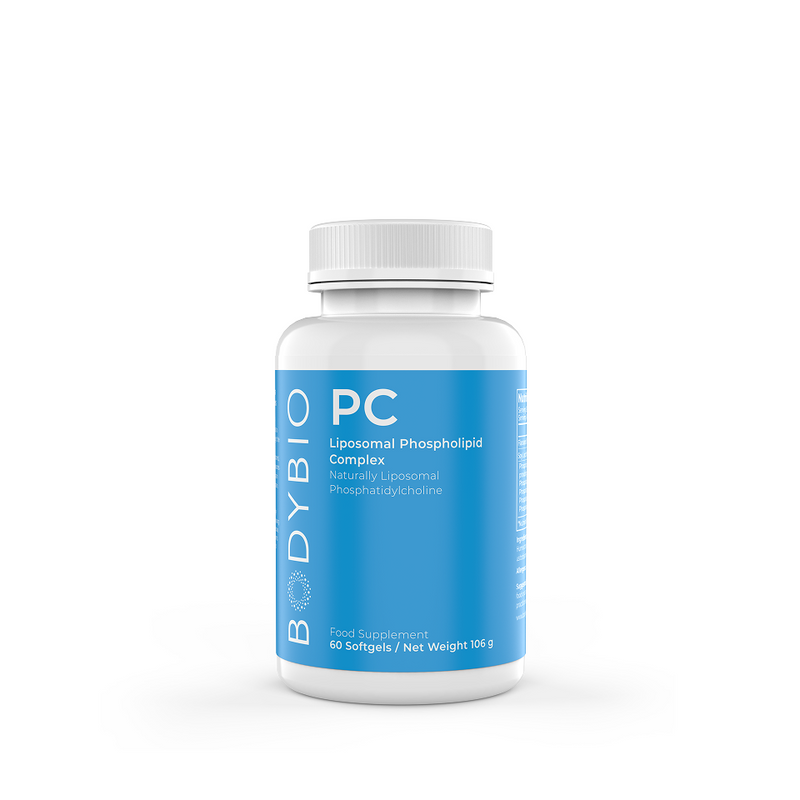Brain Composition 101: What Fats Make Up the Brain and What to Eat for Brain Health
Key Takeaways:
Our brains contain around 60% fat, one of the highest percentages of any organ in the body.
Types of fat in the brain include phospholipids, essential fatty acids, DHA, and saturated fat.
You can support the fat composition of your brain by consuming healthy fats in your diet.
So your brain is mostly made of fat — why is this important to know? The troubling fact is, more and more people are affected by cognitive decline and neurodegenerative disease every year, and modern medicine has yet to provide foolproof treatment solutions.
It will serve you well to know the types of fats that make up your brain, how to support your brain's composition, and ideally minimize the risk of cognitive decline and dysfunction before it starts.
Table of Contents:
Your Brain is 60% Fat
Why does the brain have such a high concentration of fat? Because lipids are essential to transmit and receive the electrical impulses that stimulate our thoughts, memories, and senses, aka the central functions of the brain. Lipids also act as insulation around nerve fibers and create the structure of our cell membranes. In this sense, lipids are extremely important to the essence of who we are as humans — without them, our brains would not have the extraordinary capacity for complex thoughts, feelings, and coordination that they do. Pretty amazing stuff.
With that in mind, let's take a closer look at the types of fats that make up the brain and how to support your brain's lipid composition through your diet.
Fats That Make Up the Brain
Many types of fats make up the brain, but a few stand out among the rest.
Phospholipids
Phospholipids (like phosphatidylcholine) are a type of fat that makes up your cell membranes, including neurons and other brain tissues. Phospholipids provide structure to the cell membrane, yet they're flexible enough to allow nutrients into the cell and waste out of the cell. They also help facilitate cellular communication, including nerve signals in the brain and neurotransmitter production.
We lose phospholipids as we age, so it's important to replace them through your diet, especially if you want to avoid memory lapses and wandering attention that "comes with aging." When you're conscious of consuming the right fats for your brain health, this doesn't have to be the case. In fact, phospholipids and essential fatty acids are two of the most important nutrients to keep your brain functioning well at any age.*
Essential Fatty Acids
Speaking of EFAs, these polyunsaturated fatty acids are crucial for brain health. Contrary to popular belief, both omega-6 and omega-3 essential fatty acids—linoleic acid (n-6) and alpha-linolenic acid (n-3)—are needed for optimal cellular structure and function, including neuronal function. The most important thing is to make sure you are consuming the pure, non-oxidized forms of these omega fatty acids. In their pure form, EFAs are brain fuel. In their toxic, oxidized form (which you'll find in most processed junk foods or by eating out), they will have a detrimental effect on our brain health.
DHA and Arachidonic Acid (AA)
DHA and arachidonic acid are crucial fatty acids that deserve a special mention in the context of brain structure and function, as they are incredibly important for early brain development and infant growth. You've probably heard of EPA and DHA as types of omega-3 fatty acids. DHA is the more important omega-3 for brain health (which is why BodyBio Resolvin contains a higher ratio of DHA to EPA).
Arachidonic acid plays a critical role in infant brain development and is consistently supplied through breast milk in the early weeks and months of life. Interestingly, research has shown that a precise combination of DHA and AA is necessary for optimal infant growth and development — you cannot simply replace one with the other.
While DHA and AA are most important in the early stages of life (and during pregnancy), we can still get them in smaller quantities by consuming the "mother" essential fatty acids, alpha-linolenic acid (n-3) and linoleic acid (n-6), respectively. For adults, this is enough to sustain good brain health and structure.
Saturated Fats
Saturated fats are not evil! They are and always have been paramount to brain health and cellular health. The trick is to get your saturated fat from the right sources and make sure you're consuming plenty of polyunsaturated fats (EFAs/omegas) too. Healthy sources of saturated fat include grass-fed/regenerative beef, butter, eggs, organ meats, and organic coconut oil. If you avoid saturated fat like the plague and you're experiencing lapses in memory and general cognitive decline, try adding some of these foods back into your diet and see how you feel.
Dietary Fats to Support Brain Health
So now you know the critical fats that literally build your brain. The next question is, how can we support the right lipid composition in our brains? By consuming the right healthy fats for brain and cellular health.
- Phospholipids: Eggs, liver and organ meats, high-quality milk and dairy, organic soy, sunflower seeds, and BodyBio PC*.
- Omega-6 and omega-3 essential fatty acids: organic flaxseeds/flaxseed oil, organic cold-pressed safflower oil, walnuts, wild-caught salmon, sardines, mackerel, oysters, hemp seeds/hemp seed oil, and BodyBio Balance Oil*.
- DHA: high-quality fish oil like BodyBio Resolvin.
- AA: animal foods like beef, chicken, lamb, eggs, salmon, sardines, and dairy products.
- Saturated fats: beef, eggs, organ meats, butter, ghee, and coconut oil.
At BodyBio, we recommend a modified keto diet that prioritizes these foods for brain and cellular health, alongside plenty of fruits and veggies as well as electrolytes and key minerals.
It's Never Too Late to Support Your Brain
Whether you're looking to support healthy neural development in pregnancy or combat cognitive decline as you age, it's never too late to start supporting your brain with healthy fats. Phospholipids and essential fatty acids are especially crucial for your brain and cellular health throughout the body. This is why BodyBio PC and Balance Oil are two of our most popular supplements, loved by thousands of doctors and customers alike.
Learn more about BodyBio PC, your foundational supplement for cellular health and brain function.*
Chang, C. Y., Ke, D. S., & Chen, J. Y. (2009). Essential fatty acids and human brain. Acta neurologica Taiwanica, 18(4), 231–241.
Chianese, R., Coccurello, R., Viggiano, A., Scafuro, M., Fiore, M., Coppola, G., Operto, F. F., Fasano, S., Laye, S., Pierantoni, R., & Meccariello, R. (2018). Impact of Dietary Fats on Brain Functions. Current neuropharmacology, 16(7), 1059–1085. https://doi.org/10.2174/1570159X15666171017102547
Choudhary, R. C., Kuschner, C. E., Kazmi, J., Mcdevitt, L., Espin, B. B., Essaihi, M., Nishikimi, M., Becker, L. B., & Kim, J. (2024). The Role of Phospholipid Alterations in Mitochondrial and Brain Dysfunction after Cardiac Arrest. International journal of molecular sciences, 25(9), 4645. https://doi.org/10.3390/ijms25094645
Cocchi, M., Minuto, C., Tonello, L., Gabrielli, F., Bernroider, G., Tuszynski, J. A., Cappello, F., & Rasenick, M. (2017). Linoleic acid: Is this the key that unlocks the quantum brain? Insights linking broken symmetries in molecular biology, mood disorders and personalistic emergentism. BMC neuroscience, 18(1), 38. https://doi.org/10.1186/s12868-017-0356-1
Emre, C., Do, K.V., Jun, B. et al. Age-related changes in brain phospholipids and bioactive lipids in the APP knock-in mouse model of Alzheimer’s disease. acta neuropathol commun 9, 116 (2021). https://doi.org/10.1186/s40478-021-01216-4
Hadley, K. B., Ryan, A. S., Forsyth, S., Gautier, S., & Salem, N., Jr (2016). The Essentiality of Arachidonic Acid in Infant Development. Nutrients, 8(4), 216. https://doi.org/10.3390/nu8040216
Harauma, A., Yasuda, H., Hatanaka, E., Nakamura, M. T., Salem, N., Jr, & Moriguchi, T. (2017). The essentiality of arachidonic acid in addition to docosahexaenoic acid for brain growth and function. Prostaglandins, leukotrienes, and essential fatty acids, 116, 9–18. https://doi.org/10.1016/j.plefa.2016.11.002
Henriksen, C., Haugholt, K., Lindgren, M., Aurvåg, A. K., Rønnestad, A., Grønn, M., Solberg, R., Moen, A., Nakstad, B., Berge, R. K., Smith, L., Iversen, P. O., & Drevon, C. A. (2008). Improved cognitive development among preterm infants attributable to early supplementation of human milk with docosahexaenoic acid and arachidonic acid. Pediatrics, 121(6), 1137–1145. https://doi.org/10.1542/peds.2007-1511
Kim, O. Y., & Song, J. (2024). Important roles of linoleic acid and α-linolenic acid in regulating cognitive impairment and neuropsychiatric issues in metabolic-related dementia. Life sciences, 337, 122356. https://doi.org/10.1016/j.lfs.2023.122356
Martinat, M., Rossitto, M., Di Miceli, M., & Layé, S. (2021). Perinatal Dietary Polyunsaturated Fatty Acids in Brain Development, Role in Neurodevelopmental Disorders. Nutrients, 13(4), 1185. https://doi.org/10.3390/nu13041185
Yehuda, S., & Carasso, R. L. (1993). Modulation of learning, pain thresholds, and thermoregulation in the rat by preparations of free purified alpha-linolenic and linoleic acids: determination of the optimal omega 3-to-omega 6 ratio. Proceedings of the National Academy of Sciences of the United States of America, 90(21), 10345–10349. https://doi.org/10.1073/pnas.90.21.10345










